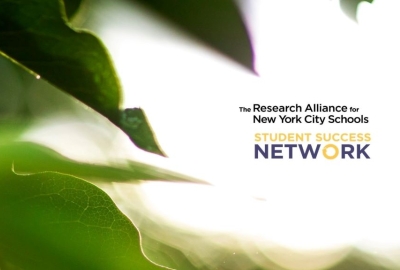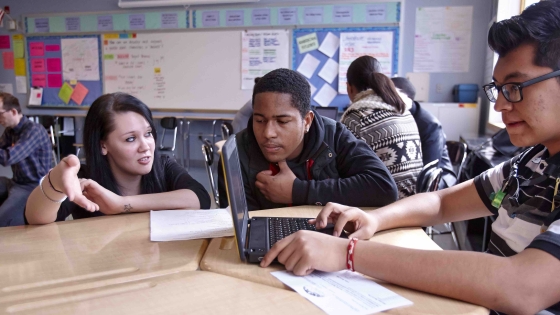
Social-Emotional Learning and Academic Growth: Insights from an Innovative Research-Practice Partnership
By Lisa Merrill, Alexandra Lotero, Reggie Gilliard, and Kristin Black
(July 2021)
Educators have long recognized that students need more than just academic skills to thrive. Social-emotional learning (SEL) skills—such as self-efficacy, growth mindset, and problem-solving—are also critical to success. SEL skills have been linked to better academic outcomes, more positive interactions with peers, and higher levels of health and happiness well into adulthood. Given the losses and disruptions to public life that have resulted from COVID-19, questions about how to support students’ SEL are more salient now than ever.
For the last five years, the Research Alliance and the Student Success Network (SSN) have been engaged in a unique research-practice partnership aimed at measuring and supporting New York City students’ SEL. Through our work together, we have developed a robust set of SEL measurement tools, practices, and insights—which have been used by SSN’s network of nearly 80 nonprofits and schools to refine their program offerings. A centerpiece of this work is the SEL-focused survey that member organizations administer to youth in their programs twice a year.
Over time, our partnership has:
- Improved the SSN survey’s validity and reliability, adding and adjusting measures, and refining survey administration to ensure that we collect high-quality data.
- Reduced the burden on students and staff by shortening the survey, reducing the average time it takes to complete from 13 to 11 minutes.
- Increased the number of students taking the survey, and improved pre-post survey response rates.
- Released versions of the survey in Spanish, Chinese, Arabic, and Bengali.
- Worked with youth interns to create a Youth-Informed Data Collection training guide for survey administrators, emphasizing the need to communicate the benefits of the survey to students.
- Used survey data to identify “bright spot” sites where youth experienced exceptional SEL growth during a program year (SSN staff then interviewed practitioners at these bright spot sites to highlight promising practices and inform continuous program improvement across the network).
- Combined data from the SSN survey with the Research Alliance’s extensive archive of data on NYC students, schools and communities, creating a powerful foundation for learning about the conditions that support SEL growth and the connection between SEL and academic success.
Our new report, Social-Emotional Learning and Academic Growth, leverages this foundation to investigate a set of questions that emerged directly from our research-practice partnership:
- How, if at all, does students’ growth in SEL (over the course of a year) contribute to improved academic performance? Which SEL competencies contribute the most?
- To what extent does the relationship between SEL and academic growth differ by student subgroup? Is growth in SEL a stronger contributor to academic outcomes for middle or high school students? For 9th graders? For students with disabilities? Do students from more disadvantaged neighborhoods benefit more or less?
The report, which was co-written by the Research Alliance and SSN, explores the answers to these questions, drawing on data for nearly 6,000 middle and high school students in New York City. Our findings were mixed. While many of the associations we tested were not borne out in these analyses, the report highlights some small but notable relationships:
- Students who demonstrated growth in SEL, particularly in Growth Mindset, Self-Regulation, and Academic Self-Efficacy, showed more growth in academic outcomes;
- Improvements in Growth Mindset and Self-Regulation were associated with larger academic gains for students who live in more structurally disadvantaged neighborhoods and students who have an Individualized Education Plan (IEP).
With the goal of informing programming, as well as future research, the report raises some fundamental questions about how SEL is defined and taught, as well as the overall purpose of schooling (i.e., a narrow focus on academics, vs. a broader vision for developing young adults). The report recommends actions that schools and youth programs can take to further explore and build on the insights from our partnership’s work to date. Future analyses from this project will examine other important questions, including questions about the relationship between SEL growth and students’ perceptions of school climate.
This project was supported by the Bill & Melinda Gates Foundation.

